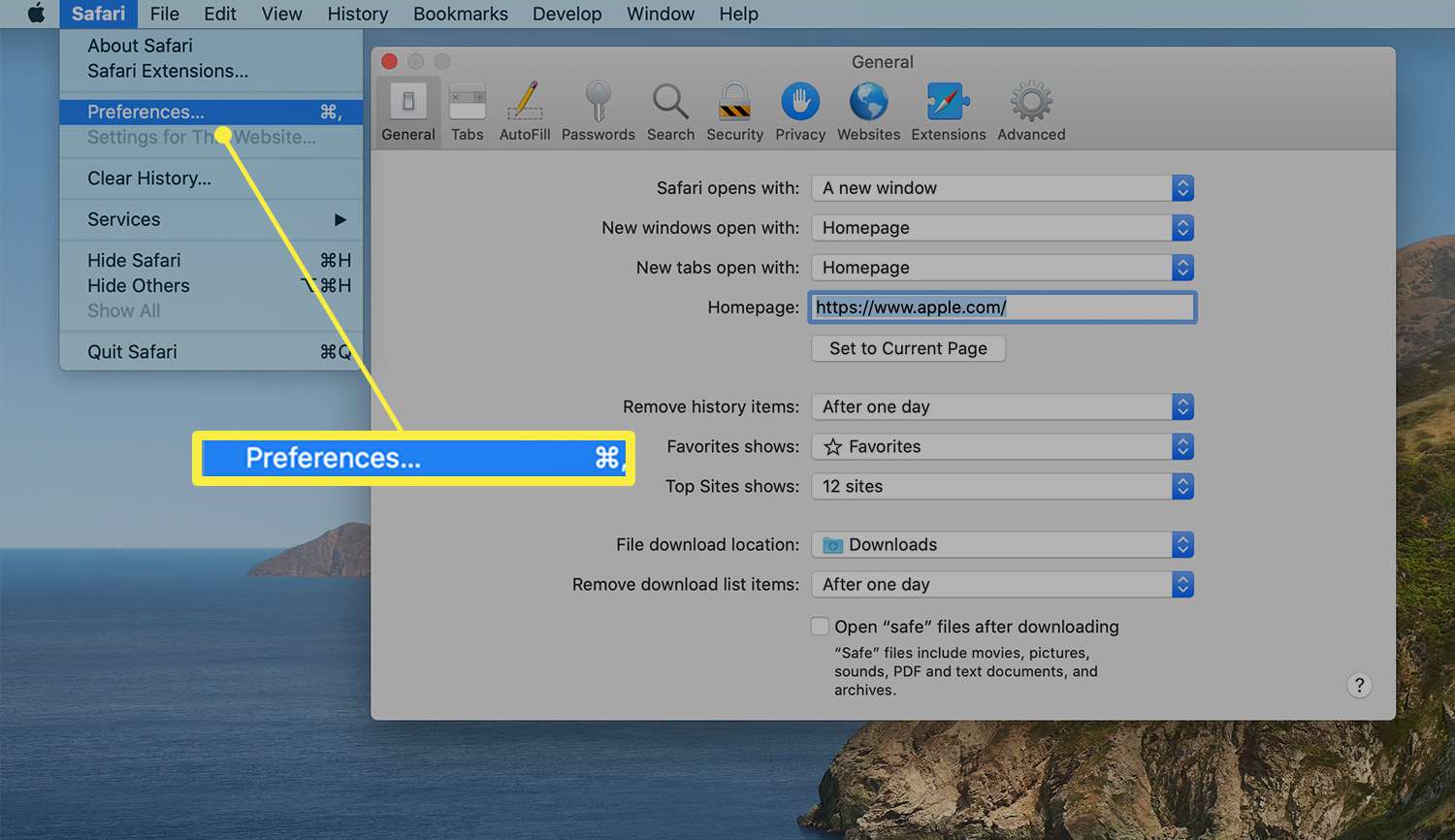Introduction
In today's digital age, web browsers have become an integral part of our daily lives, serving as gateways to the vast realm of the internet. Among the myriad of features and settings that browsers offer, the management of cookies holds significant importance. Cookies, particularly third-party cookies, play a crucial role in tracking user behavior, personalizing online experiences, and enabling targeted advertising.
As the default web browser for Apple devices, Safari is renowned for its robust privacy and security features. However, in its pursuit of safeguarding user data, Safari has taken a strict stance on third-party cookies. By default, Safari blocks these cookies, aiming to protect user privacy and prevent cross-site tracking.
While this default setting aligns with Apple's commitment to user privacy, it can sometimes lead to a less-than-optimal browsing experience for users who rely on third-party cookies for various functionalities. Therefore, understanding how to enable third-party cookies on Safari is essential for those who wish to access certain websites and services that depend on these cookies.
In this article, we will delve into the intricacies of third-party cookies, explore the reasons for enabling them on Safari, and provide a comprehensive guide on how to do so. Whether you're a casual internet user or a web developer seeking to ensure seamless functionality across different browsers, this article will equip you with the knowledge and tools to navigate Safari's cookie settings effectively. Let's embark on this journey to unravel the world of third-party cookies and harness the full potential of Safari's browsing capabilities.
Understanding Third-Party Cookies
In the realm of web browsing, cookies serve as small pieces of data that websites store on a user's device. These data snippets are designed to facilitate various functionalities, such as remembering login credentials, personalizing content, and tracking user interactions. While first-party cookies are set by the website being visited, third-party cookies originate from domains other than the one displayed in the address bar.
Third-party cookies play a pivotal role in enabling cross-site tracking and targeted advertising. When a user visits a website that contains resources from third-party domains, such as embedded advertisements or social media plugins, these third-party domains can set cookies to track the user's activity across different sites. This tracking mechanism allows advertisers and data analytics companies to gather insights into user behavior, preferences, and browsing patterns, thereby facilitating the delivery of personalized ads and content.
From a user experience standpoint, third-party cookies contribute to the seamless functioning of various online services. For instance, they enable social media integration, allowing users to share content across platforms and interact with social plugins on different websites without the need for repeated authentication. Additionally, third-party cookies are instrumental in supporting e-commerce functionalities, such as retaining items in a shopping cart across multiple sites and providing personalized product recommendations based on browsing history.
However, the pervasive use of third-party cookies has raised concerns about user privacy and data security. Critics argue that the extensive tracking facilitated by these cookies can lead to intrusive profiling and potential exploitation of personal information. In response to these concerns, major web browsers, including Safari, have implemented measures to restrict or block third-party cookies by default, aiming to enhance user privacy and mitigate the risks associated with cross-site tracking.
By understanding the role of third-party cookies in web browsing, users can gain insights into the trade-offs between personalized experiences and privacy protection. This understanding is particularly relevant when navigating Safari's cookie settings, as it empowers users to make informed decisions about enabling or disabling third-party cookies based on their preferences and requirements.
Why Enable Third-Party Cookies on Safari
Enabling third-party cookies on Safari can significantly enhance the functionality and user experience across various websites and online services. While Safari's default setting of blocking third-party cookies aligns with its commitment to user privacy, there are compelling reasons why users may choose to enable these cookies in certain scenarios.
Seamless Cross-Site Functionality
Many websites rely on third-party cookies to deliver seamless cross-site functionality. For instance, social media integration features, such as the ability to share content and interact with social plugins across different websites, often depend on third-party cookies. By enabling these cookies, users can experience uninterrupted social media interactions and sharing capabilities, without encountering authentication hurdles at every turn.
Enhanced Personalization
Third-party cookies play a pivotal role in delivering personalized content and recommendations across the web. By tracking user behavior and preferences across multiple sites, these cookies enable platforms to tailor content, advertisements, and product recommendations to individual users' interests. Enabling third-party cookies on Safari can thus lead to a more personalized and relevant online experience, particularly when engaging with e-commerce websites, content platforms, and personalized advertising networks.
Uninterrupted E-Commerce Functionality
In the realm of online shopping, third-party cookies are instrumental in maintaining a seamless e-commerce experience. These cookies enable features such as retaining items in a shopping cart across different sites, providing personalized product recommendations based on browsing history, and facilitating streamlined checkout processes. By enabling third-party cookies on Safari, users can ensure that their e-commerce interactions remain smooth and uninterrupted, without encountering obstacles related to cross-site functionality.
Access to Certain Services and Platforms
Some websites and online services may have functionalities that rely on third-party cookies for essential operations. By enabling these cookies on Safari, users can gain access to specific platforms, features, or content that require the utilization of third-party cookies. This can be particularly relevant for individuals who rely on Safari as their primary web browser and encounter limitations in accessing certain services due to the default blocking of third-party cookies.
In essence, enabling third-party cookies on Safari empowers users to unlock a myriad of cross-site functionalities, personalized experiences, and seamless interactions across various online platforms. By carefully considering the implications and benefits of enabling these cookies, users can make informed decisions that align with their preferences and browsing requirements.
Steps to Enable Third-Party Cookies on Safari
Enabling third-party cookies on Safari involves navigating through the browser's settings to modify the default cookie preferences. By following the steps outlined below, users can adjust Safari's cookie settings to allow the use of third-party cookies, thereby unlocking enhanced cross-site functionality and personalized experiences.
-
Open Safari Preferences: Begin by launching the Safari browser on your Apple device and accessing the "Safari" menu located in the top-left corner of the screen. From the drop-down menu, select "Preferences" to open the Safari Preferences window.
-
Navigate to Privacy Settings: Within the Safari Preferences window, click on the "Privacy" tab, which houses various privacy and security settings related to browsing data and cookies.
-
Adjust Cookie Settings: Under the Privacy tab, locate the "Cookies and website data" section. By default, Safari blocks third-party cookies for privacy and security reasons. To enable third-party cookies, uncheck the box next to "Block all cookies." This action will allow both first-party and third-party cookies to be stored on your device.
-
Confirm the Changes: After unchecking the "Block all cookies" option, Safari will prompt you to confirm the changes to the cookie settings. Click "Allow" or "Allow from websites I visit" to finalize the modification. This step ensures that third-party cookies are permitted, while still maintaining control over which websites can store cookies on your device.
-
Restart Safari: To ensure that the changes take effect, it is advisable to restart the Safari browser. Close the browser window and relaunch Safari to initiate the updated cookie settings.
-
Verify Third-Party Cookie Usage: Once Safari has been restarted, visit websites or online platforms that rely on third-party cookies for various functionalities. By allowing these cookies, you should experience seamless cross-site interactions, personalized content, and enhanced e-commerce features that were previously impacted by the default blocking of third-party cookies.
By following these steps, users can effectively enable third-party cookies on Safari, thereby expanding the scope of cross-site functionalities and personalized experiences available while browsing the web. It is important to note that while enabling third-party cookies can enhance certain aspects of the browsing experience, users should remain mindful of privacy implications and exercise caution when interacting with third-party content across different websites.
Conclusion
In conclusion, the management of third-party cookies on Safari presents users with a delicate balance between privacy protection and the facilitation of seamless cross-site functionalities and personalized experiences. While Safari's default setting of blocking third-party cookies underscores its commitment to safeguarding user privacy, there are compelling reasons why users may opt to enable these cookies in specific contexts.
By understanding the role of third-party cookies in web browsing and the potential benefits of enabling them, users can make informed decisions tailored to their browsing requirements. The steps to enable third-party cookies on Safari, as outlined in this article, provide a clear pathway for users to adjust their cookie settings and unlock enhanced cross-site functionalities, personalized content, and uninterrupted e-commerce experiences.
It is crucial for users to approach the enabling of third-party cookies on Safari with a nuanced perspective, considering the trade-offs between functionality and privacy. While enabling these cookies can enhance certain aspects of the browsing experience, users should remain vigilant about the potential implications for their privacy and data security. Additionally, exercising caution when interacting with third-party content across different websites is essential to mitigate the risks associated with extensive cross-site tracking.
Ultimately, the decision to enable third-party cookies on Safari rests on individual preferences, browsing habits, and the specific requirements of websites and online services. By empowering users with the knowledge and tools to navigate Safari's cookie settings effectively, this article aims to foster a balanced approach to managing third-party cookies, where users can harness the benefits of enhanced functionalities while maintaining a vigilant stance on privacy protection.
As the digital landscape continues to evolve, the discourse surrounding third-party cookies and user privacy remains a dynamic and evolving domain. Safari's stance on third-party cookies reflects the broader industry-wide efforts to strike a harmonious balance between user privacy and the seamless delivery of online experiences. By staying informed and proactive in managing cookie settings, users can navigate the digital realm with confidence, leveraging the capabilities of Safari while upholding their privacy preferences.
In essence, the journey to enable third-party cookies on Safari is not merely a technical adjustment but a nuanced exploration of the intersection between privacy, functionality, and user empowerment. As users navigate this terrain, they are poised to shape their browsing experiences in alignment with their values and preferences, thereby contributing to a more informed and conscientious digital ecosystem.
























